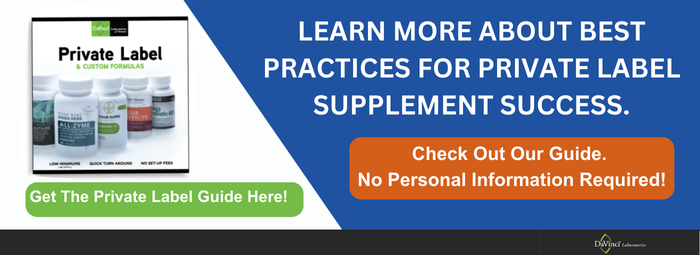If done correctly, starting a private label supplement business can truly take your practice to the next level.
Launching a private label brand ensures customers receive a high-quality product with less likelihood of searching for inferior products elsewhere, making them much more likely to see results and improvements. Essentially, it’s a win for both you and your clients.
Once you have a solid understanding of what private label supplements are and whether or not they are right for your practice, it’s time to learn the ins and outs of how to start your own successful private label business.
Starting your private label business is an exciting step toward growing your practice, but the field of private label supplements has become increasingly competitive and you’ll need to be prepared for the challenge. Following these seven steps greatly increases your chance of success as you take this necessary and strategic approach to launch your brand.
1. Create a Checklist
Beginning your strategic approach with impeccable organization is key. If you’re unsure of what might be on your initial checklist, check out the Checklist Manifesto by Atul Gawande.
First and foremost, start by outlining all aspects of your business plan, especially if you are planning to sell your products in mass quantities through e-commerce sites like Amazon or in physical retail spaces. For example, consider who your market is, who will design your label, what your customer acquisition plan looks like, what role each team member will play, and anything else specific to your practice.
Starting with a detailed checklist is foundational for business success, as it boosts the likelihood of increased sales, repeat purchases, and customer loyalty. Without a plan in place, products risk disappointing your patients or simply taking up shelf space.

2. Evaluate Your Market
Next, be sure you understand your market’s needs to design an effective action plan and business model. Think about where you’ll be selling your private label supplements—online, in a retail space, or both. This step gives you the foundation to decide how to market your supplements and create an effective fulfillment plan.
3. Choose a High-Quality Supplement Supplier
Next, decide on a supplier that:
- receives high marks from other private labelers
- has excellent quality standards
- offers the product selection you need
- is in line with your core values
- provides good service that works for your business.
Service applies to important considerations like turnaround time on reorders, label fees, and minimum shipment amounts. For example, if you have a small practice and don’t want to sit on expiring inventory, you’ll need a minimum starting shipment amount that makes sense according to your needs.
Your supplement supplier should also cite statistics—like inventory turnover—for their current clients. On average, healthy practices using private labeling turn over their supply of a product every 4-6 weeks. If a supplement supplier isn’t matching up with those statistics, it could be that they aren’t a good partner or their product is of lower quality. Any supplier should provide you with sell sheets and other materials to ensure your private label supplement is successful.
The goal is to establish a long-term relationship with your supplier based on transparent communication about the realities of your practice and the likelihood of success with various products. Choose a supplier that you feel confident and comfortable having these types of conversations with. Listen to their input on the viability of certain products’ success, whether or not they feel your practice is ready for private labeling, and if you should consider private labeling certain supplements.
4. Find the Right Products to Private Label
You’ll tailor the range of products you offer depending on your business goals and patients’ needs. There is no one-size-fits-all approach to nutritional supplements, so take the time to consider what you already—or would like to—specialize in, such as hormonal or gut support, inflammation, etc. Products will differ significantly between functional medicine providers, chiropractors, integrative medical doctors, nutritionists, and other practitioners. If you are an e-commerce vendor primarily focused on maximizing your margin, you’ll likely want to start with several top-selling formulations and grow from there.
Many providers decide to start with a small investment of a few key products and expand as they go. If those initial products are successful, you can slowly continue adding private label products to the mix.
A high-quality supplement supplier should also have knowledgeable team members who can advise on which products to begin with, based on your business and clientele.
5. Create Your Brand Logo and Label
If you already have a logo for your business, then you’ll simply send it to your representative and their design team will incorporate it into an attractive, professional label for your products. If you don’t have a logo already in place, you can work with our design team free of charge to create a label that represents your vision.
Eye-catching, high-quality labels, and packaging are key for associating your brand with reliable products and drawing attention to your work. Private label suppliers should offer graphic design experts that incorporate your logo with all of the proper labeling, such as the FDA’s required ingredient and nutrition information, ingredient disclosure, and more.
6. Set Up a Legally Established Business, If You Haven’t Already
If you are a licensed healthcare provider, you probably already have a legally established business. If not, it is important to do this as soon as possible—ideally before you start the process of private label supplements as part of your business.
If you don’t already have a legal business set up, this ten-step guide from the U.S. Small Business Administration has everything you need to know.
7. Start Selling Your Newly Branded Supplements
At this stage, you’re ready to receive your new private label supplements in the mail and begin selling. If you are a healthcare practitioner, you can expect this to be the next step in building a trusted relationship with your patients. They will continue coming to you not only for care but for product recommendations. Your patients will have more motivation to purchase high-quality supplements instead of looking for generic brands elsewhere, which will benefit both your business and their health outcomes.
If you’re still unsure as to whether launching your private label business is right for you at this time, reach out to one of our team members for more information and guidance. Approached in a systematic and smart way, private label supplements can be a cornerstone of growing your business and deepening patient-provider trust.













-1.png)




